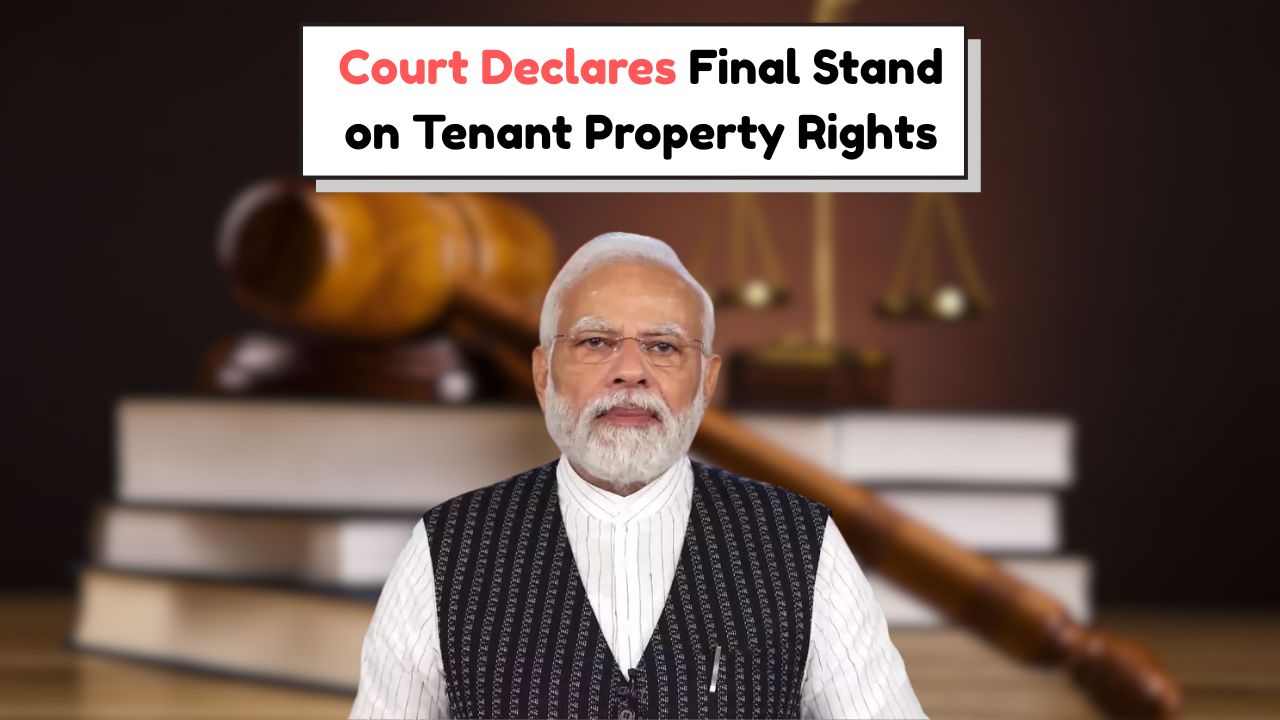Tenant Ownership Rights – In a landmark ruling that has stirred nationwide attention, the Supreme Court of India has clarified the legal standing of tenants residing in a rented property for over 20 years. This judgement comes amid growing disputes between landlords and long-term tenants, many of whom believe they have earned ownership rights through prolonged possession. The verdict lays out clear guidelines, reshaping perceptions around rental property rights.
What Was the Case About?
The legal battle involved a tenant who had been living in a property for over two decades and claimed ownership citing “adverse possession.” The case reached the apex court, raising crucial questions about tenants’ rights under Indian law and whether mere long-term occupancy can amount to ownership.
Key highlights from the case:
- The tenant had no ownership documents or sale deed.
- Claimed property under adverse possession laws.
- Landlord sought eviction on the basis of tenancy agreement expiry.
What Is Adverse Possession and Why It Matters
Adverse possession is a legal principle where a person who occupies someone else’s property openly and continuously for a specific period (usually 12 years in India) may acquire legal ownership. However, the Supreme Court ruled that tenants cannot claim adverse possession if:
- They originally entered the property with permission (i.e., through a rental agreement).
- They continue to acknowledge the landlord’s ownership.
Legal Parameters for Adverse Possession
| Legal Requirement | Application to Tenants |
|---|---|
| Possession must be hostile | Not applicable in tenancy cases |
| Possession must be continuous | Tenants renew or extend leases |
| Possession must be open | Applies, but lacks other factors |
| No legal permission | Tenants enter through agreements |
| Title claim by possession | Cannot override tenancy rights |
| Public knowledge | Generally fulfilled |
| No acknowledgment of owner | Contradicted by rent payments |
Supreme Court Verdict: Key Takeaways
The Supreme Court made it clear that long-term tenants cannot claim ownership just because they have stayed for many years. Ownership requires legal transfer or sale, not prolonged use under a lease.
Major Points from the Judgment
- Tenancy is not hostile possession: Tenants reside with legal permission.
- Rent receipts prove acknowledgment: Paying rent confirms landlord’s title.
- Renewal of agreement resets timeline: Any lease renewal nullifies adverse possession claim.
- Legal title is mandatory: Ownership cannot be claimed without legal proof.
- Intent to claim ownership must be explicit: Silent possession isn’t enough.
Legal Rights of Tenants in India
While ownership is out of reach through mere occupancy, tenants do enjoy several legal rights that protect them from arbitrary eviction and harassment.
Rights Every Tenant Should Know
- Right to peaceful possession
- Right to notice before eviction
- Right to fair rent under rent control laws
- Right to legal redressal
- Right to essential services (water, electricity)
- Right to dispute unfair clauses
- Protection under tenancy acts of individual states
Landlord’s Legal Obligations
The ruling also reinforced the importance of landlords adhering to due process when seeking to reclaim their property. Unlawful eviction attempts can be legally challenged.
Responsibilities of Landlords
| Obligation | Legal Requirement |
|---|---|
| Serve eviction notice | Mandatory as per tenancy act |
| Register rental agreement | Strongly recommended to avoid disputes |
| Maintain property infrastructure | Ensures tenant rights |
| Follow court process for eviction | Illegal eviction can attract penalties |
| Return security deposit fairly | Legal obligation post-tenancy |
| Provide rent receipts | Ensures transparency |
| Avoid harassment or threats | Criminal offence under various laws |
Can Long-Term Tenants Ever Become Owners?
Yes, but only under certain conditions that go beyond just prolonged stay. Tenants must convert their status through a legal sale, gift deed, or relinquishment deed—not through mere duration.
Legitimate Ways Tenants Can Own Property
- Buying the property legally
- Being gifted the property via a registered gift deed
- Inheritance through a will or legal heirship
- Court orders in family settlements
- Transfer of ownership with landlord’s consent
Comparison: Tenant vs Owner Rights
| Aspect | Tenant | Owner |
|---|---|---|
| Property Title | No | Yes |
| Right to Sell | No | Yes |
| Eviction Protection | Yes (under law) | Not applicable |
| Right to Modify Structure | No | Yes (as per local laws) |
| Tax Responsibilities | No | Yes |
| Transfer Rights | Cannot transfer | Full rights to transfer |
| Legal Protection | Limited to rental disputes | Full property protection |
The Supreme Court’s decision brings much-needed clarity to the ongoing confusion surrounding long-term tenancy and ownership rights. The judgment reinforces the principle that legal ownership cannot be assumed simply through extended occupancy. It also protects the rights of property owners while maintaining fair treatment for tenants under tenancy laws. Renters must understand that their rights are protected, but ownership can only be achieved through legal channels.
FAQs
Q1. Can a tenant claim property after 20 years in India?
No, not if the tenant entered through a rental agreement and continued acknowledging the landlord’s ownership.
Q2. What is adverse possession, and does it apply to tenants?
Adverse possession allows property claim after 12 years of hostile possession. It does not apply to tenants who entered with permission.
Q3. What documents prove tenancy and prevent ownership claims?
Rent receipts, lease agreements, and registered contracts serve as legal proof of tenancy, not ownership.
Q4. Can a tenant stop paying rent and claim ownership?
Stopping rent payments does not grant ownership and may lead to eviction and legal action.
Q5. What should landlords do to avoid such disputes?
Landlords should register agreements, collect rent with receipts, and serve legal notices if eviction is needed.
